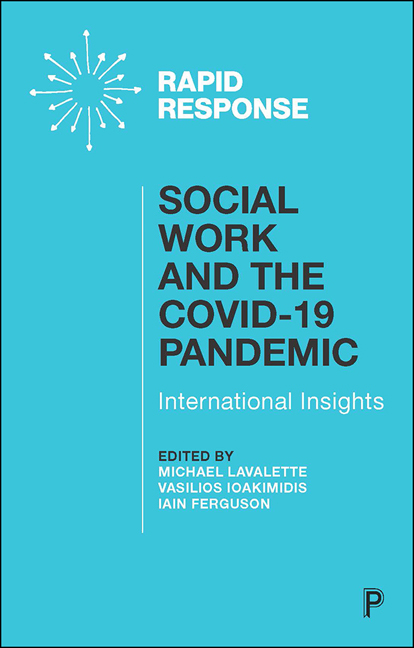12 - Social Work and COVID-19 in Greece
Published online by Cambridge University Press: 23 March 2021
Summary
Government's response and society
According to WHO, on 15 July 2020 there were 3,826 confirmed cases of COVID-19 in Greece with 193 deaths. During the last months, Greece managed to achieve a low pandemic rate due to measures concerning social distancing and early lockdown. However, there are three other issues that are behind these ‘successful’ policy that are not often addressed in public discourse. First, as Alexis Benos (2020) argues, Greece is “in the margins of the capitalist production”, which, amongst others, entails intensification of mass production and all its ills such as the tragic working conditions. Second, the Greek public health sector has been totally abandoned by the government, which leads to the third issue that the health system would be unable to afford or handle a large-scale hospitalisation of COVID-19 patients. Greece is following the pace of a global trend where health systems across the world collapsed as a result of “40 years of neoliberalism”, which “has left the public totally exposed and ill prepared to face a public health crisis on the scale of coronavirus” as David Harvey (2020a) argues. In fact, since 2019 the right-winged Greek government has deepened the degradation of the public health sector by attempting to merge it with the private sector.
Since the pandemic outbreak, the Greek Federation of the Unions of Hospital Doctors (2020) repeatedly pointed out the lack of staff and protective equipment in the hospitals.
The pandemic had made more than apparent across the world the need of a strong public health system. Yet, this is not the priority of the Greek government.
While COVID-19 and climate change are the most recent aspects of the crisis, the general impact of neoliberal capitalism on society should not be lost. More specifically, the over-10-year crisis of neoliberal capitalism in Greece, which was exposed with the financial crisis of 2008, was used as a pretext by the government to dismantle the welfare state and public sector (Papatheodorou 2018), resulting in the wellknown austerity measures, whose tremendous consequences are still palpable on the population. The negative implications of neoliberal capitalism were further exposed as the so-called “refugee crisis” emerged (Khiabany 2016). There is enough evidence to suggest that refugees routinely experience violations of their human rights due to the EU's punitive and hostile policies, leading to thousands of deaths (Karageorgiou 2016; Khiabany 2016).
- Type
- Chapter
- Information
- Social Work and the COVID-19 PandemicInternational Insights, pp. 87 - 94Publisher: Bristol University PressPrint publication year: 2020

